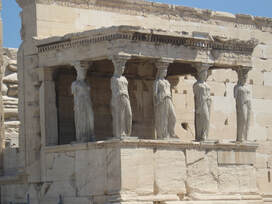Democracy Newsletter, July 2023By Steve Zolno Many anthropologists who have looked into the structure of human societies believe that our earliest origins point to humans being democratic. (See, e.g.: Francis Fukuyama, The Origins of Political Order, 2011, p. 53: “For bands and tribes, social organization is based on kinship, and these societies are relatively egalitarian.”)  Acropolis — Photo by Steve Zolno Acropolis — Photo by Steve Zolno As bands turned into tribes and then nations, a central authority figure emerged who was far removed from the immediate lives of most members of society. That was an individual or group that created and enforced the rules by which people — other than themselves — were required to live. Those who came into power usually sought to retain it for themselves and their families. An exception was the early experiment in democracy in ancient Greece, which ultimately failed. People submit to authority because they are protected by living in large societies rather than trying to survive on their own. To use Hobbes’ famous phrase, in a state of nature life is “nasty, brutal and short.” (Thomas Hobbes, Leviathan, Chapter XIII, Part 9: “Of the Natural Condition of Mankind as Concerning Their Felicity and Misery.”) His view, in a time before modern democracy, was that any state is preferable to none. Perhaps it is fair to say that most of us seek the comfort of living in a society, but when we believe ourselves oppressed, we seek freedom. Thus we are both social animals and people with an essential belief in our value as individuals. The way this plays out in our everyday lives is that we don’t want to be isolated from society but also seek to express our individuality. Every political movement — ancient, modern and those in between — can be seen in this light. Many countries that seemed to have been moving toward democracy over the last century have become mired in autocracy, while many individuals under autocratic rule have expressed their desire for freedom. In the US, which was founded on overthrowing what was considered an authoritarian regime, there still are many who are convinced that the current government is oppressive and does not recognize their essential needs.  Washington Attacking the Hessians — Emanuel Leutze Washington Attacking the Hessians — Emanuel Leutze We might ask if it is possible to create a government that satisfies both of our desires for stability and freedom. That was the intent of the US founders as they wrote the Constitution in response to a failed attempt at government under the Articles of Confederation in the years after the Revolutionary War. If human nature mandates we dwell on what is missing in our lives and country, rather than the direction we want to go, there may be no type of government that can satisfy our desire for stability and freedom at the same time. If, however, we stress educating our population about how responsibility on the part of citizens is required to sustain the benefits of democracy for everyone, it may be possible to work toward a truly participatory type of government. The essential principles of such a system cannot be written into law; they need to be understood by the majority of individuals who support real democracy based on compromise as well as insisting on one’s rights. Realizing that my freedom is limited by where it impinges on that of others is the most essential step to protecting me and others at the same time. Freedom and rights as we usually understand them fail to provide the accountability that makes democracy work. We operate as much by habit as principle. Our custom of considering only our individual needs fails to recognize the poorly functioning democracy to which it contributes. Dialogue with others toward workable solutions at all levels — in government, organizations, schools, families and our personal lives — is our only hope for maintaining democracy. The course of democracy in the United States will largely be determined by our upcoming elections. The most essential principle of democratic rule of law is holding each of us responsible for contributing to the type of country that respects the rights and dignity of everyone. If a candidate or party that promotes this principle prevails, American democracy will likely be preserved; if those prevail who do not believe that this principle applies to them as well as everyone else, our democracy likely will become another failed experiment. Steve Zolno graduated from Shimer College with a bachelor’s degree in Social Sciences and holds a master’s in Educational Psychology from Sonoma State University. Steve has founded and directed private schools and a health-care agency in the San Francisco Bay Area. He is the author of six books. Please recommend this newsletter to people who you think might appreciate it. If you want to be added to the email list to receive each new newsletter when posted, fill out our contact form and check the box just above the SUBMIT button. You may also use that form to be removed from our list.
Visit our Books page for information about purchasing The Future of Democracy, The Death of Democracy, Truth and Democracy, and Guide to Living In a Democracy. Click ↓ (#) Comments below to view comments/questions or add yours. Click Reply below to respond to an existing comment.
1 Comment
P.R.
7/5/2023 05:58:48 pm
Another origin of working democracy:
Reply
Your comment will be posted after it is approved.
Leave a Reply. |
 5th edition now available 5th edition now available
Steve ZolnoSteve Zolno is the author of the book The Future of Democracy and several related titles. He graduated from Shimer College with a Bachelor’s Degree in Social Sciences and holds a Master’s in Educational Psychology from Sonoma State University. He is a Management and Educational Consultant in the San Francisco Bay Area and has been conducting seminars on democracy since 2006. Archives
July 2024
Categories |
 RSS Feed
RSS Feed